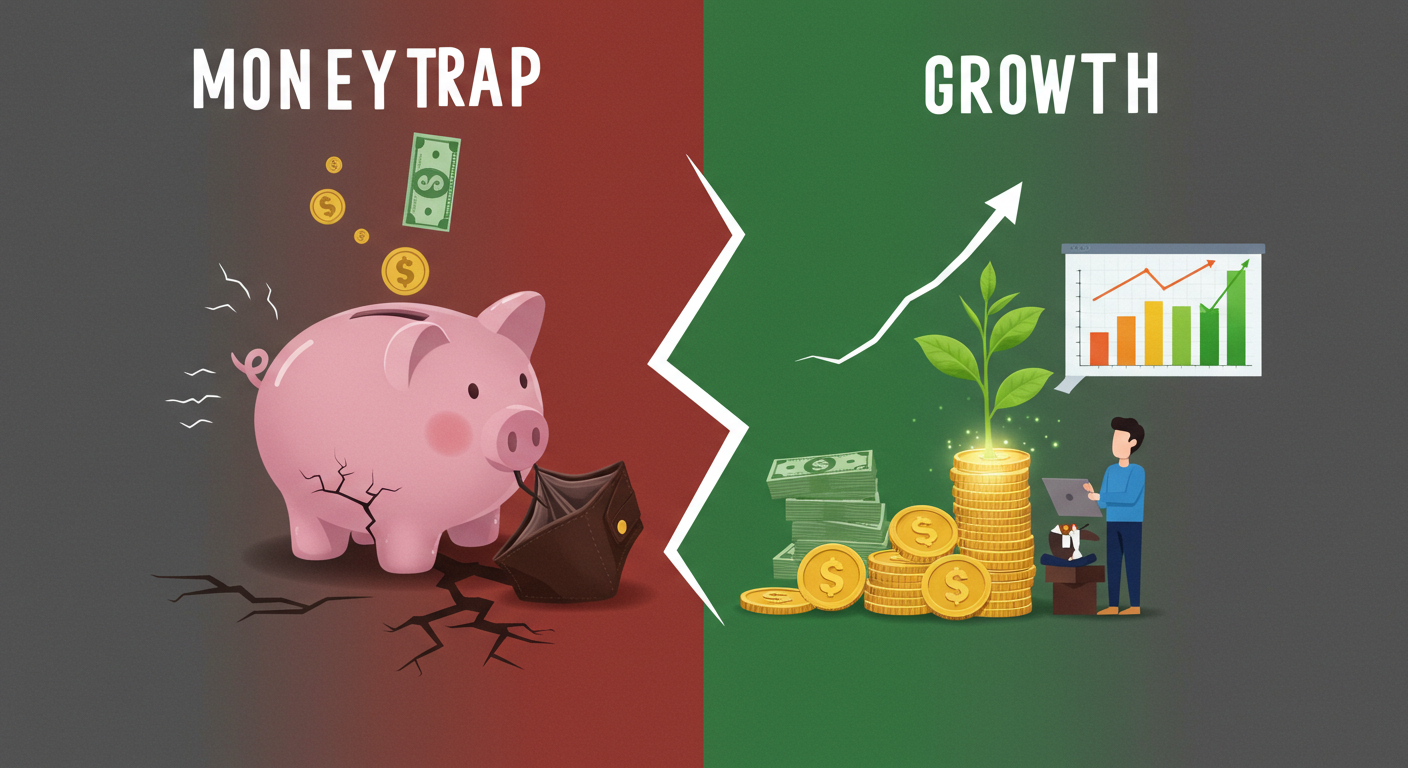Finance
Why Your Savings Are Losing Value: Avoid These Money Traps and Grow Wealth Instead
Are You Losing Money Without Knowing It?
Imagine working hard every day, saving diligently, only to realize your money is silently losing value. Sounds frustrating, right? Unfortunately, many of us are unknowingly putting our hard-earned cash into risky or low-return places like ajo/susu, unregulated cooperatives, or idle bank accounts. These money traps not only jeopardize your savings but also keep you stuck in a cycle of financial struggle, far from the financial freedom you deserve.
In this guide, we’ll uncover why these common savings habits are doing more harm than good. More importantly, we’ll show you how to avoid money traps and redirect your funds into secure, high-yield options that grow your wealth safely. Whether you’re a beginner or looking to optimize your savings, this article will empower you with practical tips and motivational insights to take control of your financial future. Let’s dive in!
The Hidden Risks of Ajo/Susu Savings Schemes
Ajo, susu, or contribution schemes are popular in many communities. A group of people agrees to pool money monthly, with each person taking a turn to collect the lump sum. It sounds like a disciplined way to save, but the risks often outweigh the benefits. Here’s why ajo savings fail for most participants.
What Is Ajo/Susu, and Why Do People Join?
Ajo (or susu, adashe, or esusu, depending on the region) is a rotating savings scheme. For example, ten people might agree to contribute $100 monthly. Each month, one person receives the $1,000 pool, and the cycle continues until everyone gets their turn. It’s appealing because:
- It feels like a forced savings plan, encouraging discipline.
- It promises a lump sum for big purchases or emergencies.
- It’s community-driven, often among friends, colleagues, or church members.
However, as tempting as it sounds, ajo is a high-risk savings scheme that can lead to significant losses. Let’s explore why.
The Disadvantages of Ajo/Susu
Based on real-life experiences, here are the key reasons to avoid putting your money in ajo:
- High Risk of Loss: Ajo relies on trust, and trust can be broken. If one person defaults—due to job loss, medical emergencies, or dishonesty—everyone else suffers. For example, a colleague once begged to skip a $50,000 contribution because of a car purchase, promising to repay later. After losing his job, he never paid back, resulting in a $100,000 loss.
- No Interest Earned: Unlike investments, ajo doesn’t grow your money. You get back exactly what you put in (or less, if someone defaults). In an economy where inflation erodes purchasing power daily, idle money is a losing game.
- Administrative Charges: Some ajo groups now impose fees to cover bank transfer costs, reducing your returns even further.
- No Peace of Mind: Constant worry about whether others will pay their share steals your peace. If a participant faces a crisis or, worse, passes away, recovering your money becomes nearly impossible.
A Real-Life Lesson
Ten years ago, while working at a top commercial bank, I joined an ajo with colleagues, contributing $50,000 monthly. It seemed safe—after all, we saw each other daily and could monitor accounts. But when my turn came, a colleague’s default led to a $100,000 loss. Even after he bounced back financially, he never repaid me. Stories like this are common, from workplace contributions to community groups. Share your own experience in the comments—your story could save someone else from making the same mistake!
Why You Should Rethink Ajo (Thrift)
If you’re using ajo to stay disciplined with savings, there are better alternatives that offer security, interest, and peace of mind. We’ll explore these later, but for now, know that ajo’s risks make it a poor choice for anyone serious about financial freedom through smart investing.
The Pitfalls of Unregulated Cooperatives
Cooperatives are another common savings option, especially in workplaces or communities. While some are registered and regulated, many operate like ajo, with no formal oversight. These unregulated cooperatives are risky and rarely help you grow wealth safely. Let’s break it down.
What Are Cooperatives, and Why Are They Popular?
Cooperatives pool money from members, often with the promise of loans, dividends, or lump-sum payouts. They’re popular because:
- They seem organized, especially in workplaces or associations.
- They offer a sense of community and shared financial goals.
- Some provide access to loans at lower rates than banks.
However, unless a cooperative is registered with a government body and invests funds in secure financial institutions, it’s essentially a group of people trusting each other with their money—much like ajo.
Why Unregulated Cooperatives Are Risky
Here are the key disadvantages of cooperative savings when they lack regulation:
- High Risk of Mismanagement: Without oversight, funds can be misused or lost. I once knew a colleague in a government workplace who joined a cooperative, thinking it was safe because “no one gets sacked.” But when a member passed away after collecting their share, the group couldn’t recover the funds, leading to losses for others.
- Low or No Interest: Most unregulated cooperatives don’t invest the pooled money, so you earn little to no interest. Your money sits idle, losing value to inflation.
- Lack of Transparency: Without formal documentation, you have no guarantee that your money is safe or being managed properly.
- No Peace of Mind: Like ajo, you’re constantly worried about what might happen to your savings if a member defaults or something goes wrong.
A Better Approach to Cooperatives
If you’re drawn to cooperatives, opt for those that are registered and regulated by authorities, such as the Cooperative Societies Act. These cooperatives often place funds in secure financial institutions, earning interest for members. Always verify registration and ask for documentation before joining.
Why Your Bank Account Isn’t Working Hard Enough
You might think keeping your money in a regular bank account is safe, but it’s one of the biggest financial mistakes to avoid. Unless it’s for short-term expenses, leaving large sums in a checking or low-interest savings account is a missed opportunity to grow your wealth.
The Problem with Idle Bank Accounts
Many people leave millions in commercial bank accounts, assuming it’s the safest option. However, here’s why this hurts your financial growth:
- Low Interest Rates: Most bank accounts offer minimal interest, often less than 1–2% annually. For example, a client I spoke with had millions in a major bank but was shocked to learn how little he earned compared to high-yield savings alternatives.
- Simple Interest vs. Compound Interest: Banks typically use simple interest, which grows your money slowly. Other platforms, like money market funds, use compound interest benefits to multiply your wealth faster.
- Bank Charges: Many accounts come with maintenance fees, transaction costs, or penalties that eat into your savings.
- Inflation Outpaces Earnings: With inflation rising, the purchasing power of your money decreases if it’s not earning enough interest to keep up.
A Wake-Up Call
During a one-on-one session, a client revealed he had significant funds sitting in a commercial bank, earning a fraction of what he could elsewhere. When I shared how much he could earn with a money market fund or federal government savings bonds, he was stunned. The difference was massive, even when I quoted conservative estimates! Don’t let your money sleep—make it work harder for you.
How to Optimize Your Bank Account
Keep only what you need for daily expenses (3–6 months’ worth) in your bank account. For the rest, explore options like:
- High-yield savings accounts offered by some banks.
- Fintech platforms with automated savings features.
- Investments that offer better returns with low risk.
Discuss with your banker to ensure you’re using an account with minimal fees and the highest interest rate available. Every penny counts!
Smarter Alternatives to Grow Your Wealth Safely
Now that we’ve covered the money traps to avoid, let’s explore secure investment options for beginners that help you save consistently, earn high interest, and enjoy peace of mind. These alternatives are perfect for anyone looking to build wealth without the stress of risky schemes.
Why You Need a Better Savings Strategy
Your money should work as hard as you do. In today’s economy, wealth-building strategies focus on:
- Discipline: Automating savings to stay consistent.
- High Returns: Earning 10–20% interest through secure platforms.
- Security: Choosing regulated, trustworthy options.
- Peace of Mind: Knowing your money is safe, no matter what happens to others.
Let’s look at some practical options to get started.
1. Fintech Savings Platforms
Fintech platforms like PiggyVest or Optimus are game-changers for disciplined saving methods. They allow you to automate savings and earn high interest, all while keeping your money secure.
- How It Works: Sign up, link your bank account, and set a savings schedule (daily, weekly, or monthly). The platform automatically deducts your chosen amount and invests it in secure instruments.
- Benefits:
- Earn 13–20% interest annually, paid monthly.
- Regulated by government authorities for safety.
- Flexible withdrawal options for emergencies.
- Encourages consistency without manual effort.
- Getting Started: Platforms like PiggyVest are beginner-friendly. Start with as little as $10 and watch your savings grow.
2. Money Market Funds
Money market funds are low-risk investments that offer better returns than bank accounts. They pool money from investors to buy short-term, high-quality securities like treasury bills.
- Why Choose Them:
- Earn 10–15% annually, with compound interest benefits.
- Highly liquid, allowing withdrawals when needed.
- Managed by professional fund managers for security.
- How to Start: Platforms like Stanbic IBTC offer money market funds with low entry points (as little as $50). Contact a financial advisor or check their website for details.
- Pro Tip: Set up automatic monthly contributions to stay consistent.
3. Federal Government Savings Bonds
Federal government savings bonds are one of the safest ways to grow your money, backed by the government’s guarantee.
- Key Features:
- Earn 8–13% interest, paid quarterly.
- Low risk, as they’re government-backed.
- Terms range from 2–3 years, ideal for medium-term goals.
- How to Invest: Purchase bonds through banks or licensed stockbrokers. In Nigeria, check the Debt Management Office for bond offerings.
- Why It’s Great: Perfect for beginners who want security and steady returns.
Bonus – Educate Yourself with Resources
To make informed decisions, invest in financial education. Consider:
- Books: “The Richest Man in Babylon” for timeless personal finance tips.
- Ebooks: Look for beginner-friendly guides on investing with small amounts.
- Communities: Join free Telegram or WhatsApp groups for financial advice and support.
Take Control of Your Financial Future
Your journey to financial freedom through smart investing starts with one decision: stop letting your money sleep in risky or low-return places. Ajo, unregulated cooperatives, and idle bank accounts are money traps that hold you back. Instead, embrace secure investment options for beginners like fintech platforms, money market funds, and government bonds. These options not only grow your wealth but also give you peace of mind and the confidence to dream bigger.
You’ve worked hard for your money—now make it work harder for you. Check your accounts today, move your funds to high-yield options, and take the first step toward building lasting wealth. You’ve got this, and I’m rooting for you!
Start Growing Your Wealth Today
Ready to grow wealth safely? Take these steps now:
- Sign up for a fintech platform like PiggyVest or Optimus.
- Research money market funds or government bonds with your bank.
- Join a financial education community to stay motivated and informed.
Have questions or a story to share? Drop a comment below—I’d love to hear from you! Let’s keep the conversation going and help each other achieve financial freedom.
FAQs: Your Questions Answered
Q: Why do ajo savings fail so often?
A: Ajo savings fail due to high risks like defaults, no interest earnings, and lack of peace of mind. If one person doesn’t pay, the whole group suffers, and your money doesn’t grow.
Q: Are all cooperatives bad for saving?
A: No, but unregulated cooperatives are risky due to mismanagement and low returns. Choose registered cooperatives that invest funds in secure institutions.
Q: Can I trust fintech platforms for savings?
A: Yes, platforms like PiggyVest are regulated and offer 13–20% interest. Always verify registration and read reviews before joining.
Q: How do I start investing with little money?
A: Start with fintech apps (as low as $10), money market funds ($50), or government bonds. Automate contributions to stay consistent.
Q: What’s the safest way to grow my money?
A: Federal government savings bonds are among the safest, offering 8–13% interest with government backing.
















